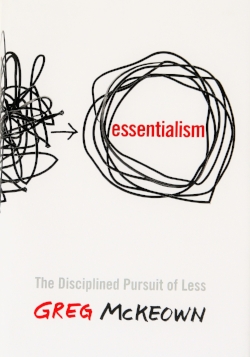The Essence of Essentialism
Many people who live in New York City follow the mantra “say yes to everything.” It’s common to work two jobs while balancing academics, extracurriculars, and a social life. There’s even more pressure to go out and take advantage of every opportunity when you live in a city that never sleeps.
We live in a world where it’s deemed a positive thing to take on more and more, thinking that the outcome will be a greater success. But that’s not the case. Even I take on too much, misjudge my time, and let all of these factors wear down other vital areas of my life.
The exhaustion from the abundance of opportunities, and often the stress that comes from it, is why I’ve loosely started focusing on essentialism. In Essentialism: The Disciplined Pursuit of Less, Greg McKeown discusses the importance of cutting out non-essentials to concentrate on the most purposeful, targeted lifestyle, focusing on depth, strength, and quality of life overbroad, hazy, and meaningless living. He helps to deconstruct the fallacy that if you can fit something in, you should.
McKeown states in an interview with Lawton Ursrey from Forbes, “There’s a word for trying to do everything all the time. Madness!” People think they need to do more, get more, fit in more. He’s not insinuating that you should never take advantage of opportunities. Essentialists are more likely to explore new opportunities but are especially selective in what they do.
One of the suggestions for living a more essential life is to live by the delayed yes. McKeown says, “Make a decision based not on external pressures. Make it based on internal clarity of purpose.” He notes that most of us pride ourselves on seizing all opportunities and think that having a jam-packed calendar is valuable. Instead, essentialists suggest finding satisfaction in missing out on the non-essential. Place value on not doing it all and saying no every once in a while. That way you can put your energy toward what truly matters. A majority of the time when we have to make more choices, the more the quality of decisions deteriorates. It is crucial to ask, “Do I love this?” not “Is there a chance this is useful?”
Derek Sivers, an entrepreneur and founder of CD Baby, addressed this in a TEDTalk.
“No more Yes. It’s either HELL YEAH! or no.” If the answer isn’t a definite yes, it’s a no. To be successful in saying yes less, you can implement a rating scale to measure the true value of a decision. Evaluate where each decision falls on a 10 point scale. If anything is lower than an 8, drop it.
McKeown also points out that “We are experiencing not just data overload, but also opinion overload with data.” Today, when people feel they don’t know what to do with their free time, they scroll through social media feeds. One way to live in the moment is to minimize the impulse to always have something to do. Constant digital preoccupation prevents your imagination from being engaged and letting true creativity happen. He begs the question, “What will it be like to live in a world and society that no longer has time to ponder?”
When I take on too many things, I typically burn out even faster. If you’re too busy to think, you’re too busy, period. So instead of keeping my days filled to the brim with activities, I designate time during the day to do things that I love: reading novels, journaling, or watching Netflix. We need space to discover essential few from insignificant many. There is nothing wrong with saying no, and it is much better than defaulting to yes.



